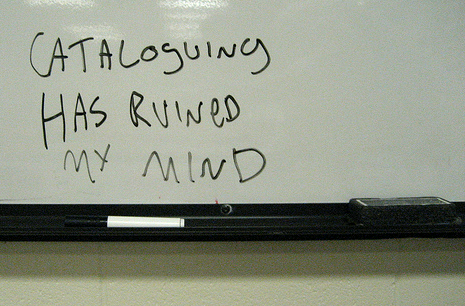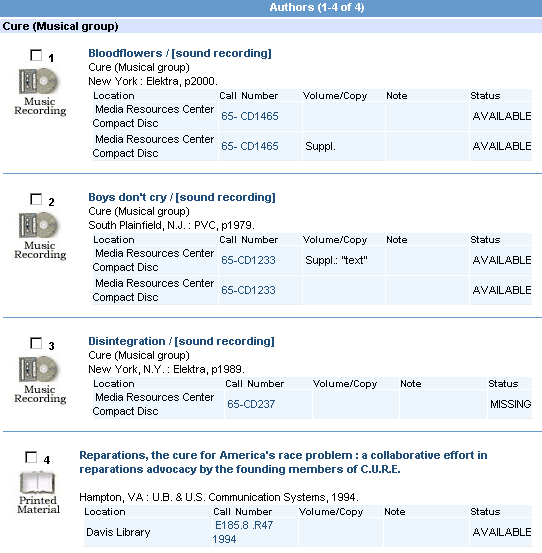This kind of info tends to slowly disappear, so I’m recording it here.
I wish there were a way to include this kind of information with or attached to a bibliographic record (or statement, in the free-from-the-tyranny-of-records future) as justification/clarification. Cataloger’s metametadata. But there isn’t a place or way to do that yet…
From Harmonie Park Press’ About Us page on 8 December 2010:
The Music Index: A Subject-Author Guide to Music Periodical Literature. Print and Online
After more than 60 years of producing The Music Index, Information Coordinators, Inc., d/b/a Harmonie Park Press, announced the sale of Music Index ONLINE to EBSCO Publishing, Inc.
The Music Index in PRINT ceased publication with Volume 61, 2009, Annual Cumulation.
From EBSCO press release dated 21 January 2010 (pdf) (local copy of pdf):
EBSCO Publishing Acquires The Music Index Online™ from Harmonie Park Press
~ Acquisition of Comprehensive Subject-Author Guide to Music Periodical Literature Complements the Collection of Music Databases Available on EBSCOhost® ~
IPSWICH, Mass. — January 21, 2010 — Continuing a strong commitment to music research, EBSCO Publishing (EBSCO) has acquired The Music Index Online™ from Information Coordinators, Inc., d/b/a Harmonie Park Press, an international leader in music reference publishing.
The Music Index Online has been available on the EBSCOhost® platform since 2005. EBSCO Publishing President Tim Collins says the acquisition makes sense given the depth and breadth of the current music resources available on EBSCOhost®. “EBSCOhost has become the leading platform for music research and it is the most-used platform for The Music Index Online. The acquisition allows EBSCO to invest in and enhance the database while continuing to offer libraries a comprehensive package of music databases.”
EBSCO press release dated 14 Jan 2005:
EBSCO Publishing Partners with Harmonie Park Press
~ EBSCOhost® Interface to Provide Access to The Music Index ~EBSCO Publishing, a leading producer and distributor of online research databases, and Harmonie Park Press, an international leader in music reference publishing for over fifty-five years, have agreed to make The Music Index available through the EBSCOhost® platform in the coming months. Published since 1949, The Music Index is the single most comprehensive annual subject-author guide to music literature.
According to Mark Herrick, vice president of business development at EBSCO Publishing, “We are thrilled to be able to offer our customers online access to The Music Index. This database fits very well with our growing collection of resources covering the Arts & Humanities”. EBSCO Publishing continues to make available niche databases that represent the definitive reference resource for a given area of study. Nearly 150 databases are now offered via the EBSCOhost platform.
The editor-librarians at Harmonie Park Press have surveyed data from more than 725 international music periodicals from over 40 countries in 23 languages. Topics concerned with every aspect of the classical and popular world of music are thoroughly categorized and organized according to the framework of an internal Subject List which includes both Subject and Geographic headings. Covering all styles and genres of music, The Music Index duly cites book reviews, obituaries, new periodicals, and news and articles about music, musicians, and the music industry. The thoroughness of indexing and subject heading research, along with comprehensive coverage of the music field, makes The Music Index an invaluable resource for both the novice scholar and the experienced academician.
Elaine Gorzelski, president of Harmonie Park Press, said, “We look forward to working with EBSCO to make The Music Index Online available through the popular EBSCOhost platform. This decision is based on our commitment to enhance the usefulness of The Music Index Online. Users will benefit from having additional access to full text articles.” EBSCOhost’s inherent linking capabilities allow subscribing libraries to establish links from citations in The Music Index to corresponding full text found in their other EBSCOhost databases as well as e-journal collections.
EBSCO will communicate more information about the release of The Music Index database on EBSCOhost in the coming months.
EBSCO Publishing, EBSCO Subscription Services, and EBSCO Book Services form the EBSCO Information Services group. EBSCO is a worldwide leader in providing information access and management solutions through print and electronic journal subscription services, research database development and production, online access to approximately 150 databases and thousands of e-journals, and online book purchasing. EBSCO has specialized products and services for academic, medical, government, public and school libraries as well as for corporations and other organizations. EBSCO maintains a comprehensive database of more than 282,000 serial titles and upholds active relationships with more than 60,000 publishers worldwide. 2004 marks EBSCO’s 60th year of serving the library and business communities. For more information, visit www.ebsco.com.
Catalog in the smog report: 18 records for this in WorldCat today. 11 of them English language of cataloging.

